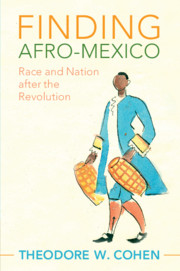Book contents
- Finding Afro-Mexico
- Afro-Latin America
- Finding Afro-Mexico
- Copyright page
- Dedication
- Contents
- Figures and Maps
- Acknowledgments
- Abbreviations
- Introduction
- Part I Making Blackness Mexican, 1810–1940s
- Part II Finding Afro-Mexico, 1940s–2015
- 4 Looking Back to Africa
- 5 Africanizing “La bamba”
- 6 Caribbean Blackness
- 7 The Black Body in Mexico
- Conclusion
- Bibliography
- Index
Conclusion
from Part II - Finding Afro-Mexico, 1940s–2015
Published online by Cambridge University Press: 17 April 2020
- Finding Afro-Mexico
- Afro-Latin America
- Finding Afro-Mexico
- Copyright page
- Dedication
- Contents
- Figures and Maps
- Acknowledgments
- Abbreviations
- Introduction
- Part I Making Blackness Mexican, 1810–1940s
- Part II Finding Afro-Mexico, 1940s–2015
- 4 Looking Back to Africa
- 5 Africanizing “La bamba”
- 6 Caribbean Blackness
- 7 The Black Body in Mexico
- Conclusion
- Bibliography
- Index
Summary
The conclusion traces the evolution of blackness in Mexico—its spatial orientations, histories, and relationships to culture, society, and the black body—from 1968 to the National Institute of Statistics and Geography’s 2015 intercensal survey, the first state-sponsored recognition of the nation’s visible African-descended population for the first time since independence. It examines the competing diasporic authenticities that have developed in the Costa Chica of Guerrero and Oaxaca on the one hand and in the state of Veracruz on the other since the 1980s. In broad terms, the conclusion uses the transnational histories detailed throughout Finding Afro-Mexico to examine recent debates about the legacies of the long 1960s, ‘post-racial’ societies, Afro-diasporic methodologies, and the politics of racial comparison in Western Hemisphere.
Keywords
- Type
- Chapter
- Information
- Finding Afro-MexicoRace and Nation after the Revolution, pp. 267 - 288Publisher: Cambridge University PressPrint publication year: 2020

